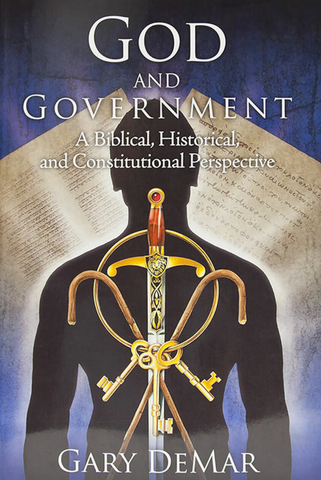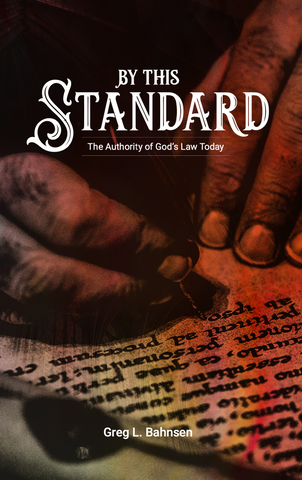Jerry Falwell, along with Ed Dobson and Ed Hindson, wrote an interesting and helpful survey of fundamentalism, appropriately titled, The Fundamentalist Phenomenon: The Resurgence of Conservative Christianity. When a movement is described as a “phenomenon,” this immediately categorizes it as a temporary oddity, a minority position that should be studied with curiosity but not accepted as the answer to all of life’s problems. Of course, this is not the way a fundamentalist would characterize his belief system. But fundamentalist literature has given little attention to the cultural and transformational side of its position. One could make the case that there is no cultural side to fundamentalism because there is no application of God’s law to society.
One will search in vain for a cultural application of the gospel in the four-volume set of The Fundamentals. Why? “This was the period (actually 1920-25) when the series of twelve small books entitled The Fundamentals were published in the United States from which the term ‘fundamentalism’ arose. When evangelicals were busy seeking to vindicate the fundamentals of the faith, they felt they had no time for social concerns.”[1] It was a “defense only” strategy. Of course, there is nothing wrong with defense, but there is no winning if no points are scored on offense. Falwell did know something about offense when he set up Liberty University. Slight mention is made of the link between “regeneration” and “reformation” in terms of a generational pursuit. It takes something to build something. There must be moral as well as practical guidelines. What standard should the rebuilding use? The application of biblical law was not a “fundamentalist” principle. The author of one article in the four-volume set tells us that “the Pharisees were the best people of their day; and yet they were the greatest failures.”[2]
He castigates those who want reformation without Christ. But he does not tell us how to go about reformation with Christ. The Pharisees were not “the best people of their day.” The best people were men like Simeon (Luke 2:25), Zacharias (Luke 1:6), and Joseph (Matt. 1:19), and women like Anna (Luke 2:36), Mary (Luke 1:46-56), and Elizabeth (Luke 1:6). Elizabeth and Zacharias “were both righteous in the sight of God, walking blamelessly in all the commandments and requirements of the Lord” (Luke 1:6). The commandments of God were neglected by the Pharisees (Mark 7:8). They “nicely set aside the commandment of God in order to keep [their] tradition” (7:9). Jesus told the Pharisees that they had the devil as their father (John 8:44). James Jordan sets the record straight:
We are used to thinking of the scribes and Pharisees as meticulous men who carefully observed the jots and tittles [of God’s law]. This is not the portrait found in the Gospels. The scribes and Pharisees that Jesus encountered were grossly, obviously, and fragrantly breaking the Mosaic law, while keeping all kinds of man-made traditions. Jesus’ condemnation of them in Matthew 23 certainly makes this clear, as does a famous story in John 8. There we read that the scribes and Pharisees brought to Jesus a woman taken “in the very act” of adultery (John 8:1-11). How did they know where to find her? Where was the man who was caught with her? Apparently he was one of their cronies. Also, when Jesus asked for anyone “without sin” (that is, not guilty of the same crime) to cast the first stone, they all went away, because they were all adulterers.[3]
A persistent belief beleaguers the church because the Pharisees have been portrayed as strict adherents to the law, and Jesus had His greatest theological disputes with the Pharisees, therefore, Jesus was opposed to the law. This is not what the Bible teaches. When the “scribes and the Pharisees … seated themselves in the chair of Moses,” that is, when the law was properly taught and applied, the people were to do all that they told them (Matt. 23:2-3). At the same time, Jesus admonished the people “not to do according to their deeds” (v. 3).
The end of the Moral Majority was inevitable because of its defense-only strategy. As long as there was an enemy to attack, the organization could sustain itself.
One student of the religious right, sociology professor Jeffrey Hadden of the University of Virginia, characterized the impending shutdown as “totally anticlimactic.” Though it raised a lot of fuss, the Moral Majority never developed into much of a grassroots organization. More important, the nation’s broader conservative tide, which lifted Ronald Reagan and then George Bush into the White House, left Falwell with nobody much to oppose. Says Hadden: “It’s hard to sustain political activity when you don’t have an enemy.”[4]
Had the Moral Majority been too successful in routing its enemies as Hadden implies? Hadden did not understand the finer points of theology. There is a reason why there are different theological currents and groups. The sociologists and the general public often see Christians as monolithic, thus labeling the diverse groups as the conglomerate “religious right.” This is a monumental mistake as Ted Koppel found out when he interviewed Jim and Tammy Bakker [5] of the long defunct PTL Club. “Anyone who watched a befuddled Ted Koppel on ABC’s ‘Nightline’ try to grapple with the distinctions among fundamentalist Baptist Jerry Falwell, Pentecostal Jimmy Swaggart, and the more mainline Robert Schuller could see that an important educational process was at work.”[6] Describing Robert Schuller as “more mainline” tells anyone in the know that even these authors do not understand the distinctions among the various theological traditions. There are many noted groups and movements that would not accept the labels of “fundamentalist” or “Pentecostal.”
Fundamentalism developed during a theological war, and Falwell and the Moral Majority continued the tradition, albeit with much more sophistication and intellectual acumen. Ed Dobson (1949-2015) dropped out of the larger fight and returned to the pastorate.
By the late 1980s, Dobson had drifted away from fundamentalism toward mainstream evangelicalism and decided that the rationale behind the Moral Majority had been wrongheaded and that to a significant degree cultural problems could not be remedied through the political process.[7] In 1987, Dobson left Liberty (just as Falwell became responsible for the empire of failed televangelist Jim Bakker), and Dobson took the pastorate of Calvary Church in Grand Rapids, Michigan, where he remained for eighteen years (1987-2005)…. In January 2009, Dobson was interviewed on Good Morning America because he had attempted to live a year as Jesus had, observing Sabbath and Jewish holidays and festivals. Dobson said that he had voted for Barack Obama on the grounds that Obama “was closer to Jesus’s teachings.” (Source)
The long-term process of reformation and reconstruction is difficult, especially when the opposition is so formidable. The solution is not to retreat or capitulate. “While disagreeing with Obama on abortion, Dobson said the Democrat was the candidate closest to the spirit of Jesus’ teachings of compassion and peace.”[8] I believe that so much of the confusion that’s still part of Fundamentalism and Evangelicalism is the failure to develop a full-orbed biblical worldview. Politics certainly isn’t everything, but it’s nearly that today. Political participation is necessary to dismantle the edifice. The idol physical temple in Jerusalem in the first century was an impediment to the richness and reality of the New Covenant and the planned obsolescence of the Old Covenant.
The temple had to go. The same is true of our political idols and everything that comes with them. If the goal is to switch teams but get the same policies, then nothing changes. Every aspect of what we call ‘government’ must be assessed, studied, and critiqued. It’s not only about the presidency. There are down-ballot as well as state and county issues. What shouldn’t the ‘government’ be involved in? What can we do right now to minimize the power and authority of civil government? Education is probably the most likely area of change that could be accomplished overnight if Christians made the decision to remove their children from government schools. If they won’t do this, they won’t do much else.

God and Government
American Vision has thoroughly renovated, revised, and updated Gary DeMar’s monumental work into this beautiful one-volume hardback. With a fresh new look, more images, an extensive subject and scripture index, and an updated bibliography, God and Government is ready to prepare a whole new generation to take on the political and religious battles confronting Christians today. May it be used in a new awakening of Christians in America—not just to inform minds, but to stimulate action and secure a better tomorrow for our posterity.

By This Standard: The Authority of God’s Law Today
Millions of Christians, sadly, have not recognized the continuing authority of God’s law or its many applications to modern society. They have thereby reaped the whirlwind of cultural and intellectual impotence. They implicitly denied the power of the death and resurrection of Christ. They have served as footstools for the enemies of God. But humanism’s free ride is coming to an end. This book serves as an introduction to this woefully neglected topic.
[1] John Stott, Involvement: Being a Responsible Christian in a Non-Christian Society, 2 vols. (Old Tappan, NJ: Fleming H. Revell, 1984), 1:25
[2] George W. Lasher, “Regeneration—Conversion—Reformation,” The Fundamentals: A Testimony to the Truth, R. A. Torrey, A. C. Dixon, et al., eds., 4 vols. (Grand Rapids, MI: Baker Book House, [1917] 1988), 3:140.
[3] James B. Jordan, Through New Eyes: Developing a Biblical View of the World (Brentwood, TN: Wolgemuth & Hyatt, 1988), 267.
[4] “Scrapping,” Time, 26.
[5] “Ted Koppel had warned Jim and Tammy at the beginning of the ‘Nightline’ program ‘not to wrap themselves in the Bible.’ By the end of the program, it was Koppel who had been wrapped in the mesmerizing melodramatic tragicomic fantasy the couple had spun.” Haddon and Shupe, Televangelism, 10.
[6] Haddon and Shupe, Televangelism, 17-18.
[7] Cal Thomas and Ed Dobson, Blinded by Might: Can the Religious Right Save America? (Grand Rapids, MI: Zondervan, 1999), 15.
[8] “Critics: Man ‘living like Jesus’ should not have voted for Obama,” The Christian Century (February 10, 2009). “Given Obama’s voting on abortion, those are some very un-Jesus-like votes,” said Michael Wittmer, author of Don’t Stop Believing: Why Living Like Jesus Is Not Enough.
















